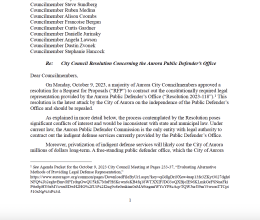Change can be slow. The legal process takes time, and it can take months or years to see the results of hard work on behalf of civil liberties. Getting an unconstitutional policy changed in 48 hours is almost unheard of, but that’s exactly what I was able to do last week.
My ten-week summer internship at the ACLU of Colorado was drawing to close and I was getting ready to head back to California to start my second year of law school at the University of California at Irvine. Like other legal interns, I was prepared to leave the ACLU with the confidence that I had contributed to future legal victories, but I certainly didn’t expect to produce a concrete policy change in my last days that would affect all future interns as well as Denver inmates in need of legal assistance.
And yet that’s exactly what I did. It started with a letter requesting assistance from an inmate at the Denver County Jail. Deciding that the case merited further scrutiny but unable to spare the time to meet with him, my internship supervisor, ACLU staff attorney Rebecca Wallace, asked me to send a letter to the jail notifying them that I was working under Rebecca’s supervision and would be visiting the jail to interview the inmate on behalf of the ACLU. It was going be my first time interviewing a client on my own and I was excited about the opportunity. Unfortunately, despite the fact that the ACLU has sent numerous interns to speak with inmates at jails and prisons in the past without issue, the letter I sent to the jail was faxed back with “REFUSED” stamped across the front. Rebecca called the Division Chief of the Denver County Jail and asked that he reconsider his decision, but he refused and referred her to an assistant city attorney.
Undaunted and sure that the law was on our side, Rebecca and I quickly did some research on cases involving interns and other non-attorneys visiting clients on behalf of an attorney. We hit the jackpot – a 1974 U.S. Supreme Court case confirmed that interns have the right to meet with clients with the approval of their supervising attorney and that failure to allow them to do so is a violation of due process rights. Rebecca took our findings back to the city attorney and within hours we received notice that the policy would be changed effective immediately.
Feeling a strong sense of accomplishment and pride, I drove to the jail and met with the inmate. It turns out that he had been languishing in jail for over three months without charge and he was very grateful that he was finally given the chance to tell his story.
So as I prepare to leave the ACLU, I am happy knowing that I was able to affect a change that will have concrete, immediate benefits for future interns and inmates in need of legal assistance.
Change is (usually) slow.
